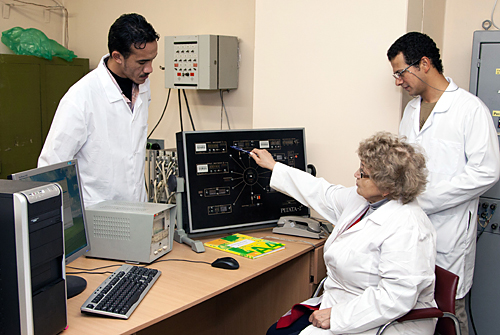JINR-Egypt: Project #405
News, 12 January 2012
Project #405 “Assessment of the environmental situation in the delta of the Nile River using nuclear and related analytical techniques” – one of the directions actively developed between Egypt and JINR. A research worker from the Atomic Energy Authority of Egypt (Dr. Wael Mahmoud Badawy) and a demonstrator from the Faculty of Science – South Valley University (Qena) Khaled Ali Mohammad arrived to Dubna to carry out the experimental part of the project. They brought ecological samples for multi-element neutron activation analysis and participated in the experiment on the REGATA system of the modernized reactor IBR-2. Before departure to the home country, the guests from Egypt told about their impressions to the correspondent of our weekly newspaper:
The researchers from Egypt started a conversation with the expression of deep gratitude to Professor Hussein El Samman, the Coordinator of the ARE-JINR Cooperation, and to Professor Tarek Hussein, the Representative of the ARE Government in JINR, for the opportunity to arrive to JINR.
Actually, this is my first trip abroad, especially to such a distant country like Russia, and particularly in winter – Khalid began. – It was not that simple to get in this project: the information about it was spread to several universities in Egypt, and all who wished to participate in it passed a rigorous procedure of selection. I studied at the Faculty of Science; I made a Master’s work on the radiation physics to explore the effect of radon on the environment. Familiarity to the neutron activation analysis will contribute to my knowledge necessary to determine heavy metals and other trace elements in soils and sediments of the water of the Nile Basin.
I got a great chance to come to JINR! Here I learned a lot, met with the experience of research carried out at the sector of the NAA and Applied Research Division of Nuclear Physics, FLNP. My impressions are the best, the acquired knowledge and the results I hope to use for the benefit of Egypt.
I did postgraduate studies at Moscow State University – said Wael – and I first visited JINR as a university student in 2009 for a summer practice. Then I studied the computer modeling at the Laboratory of Radiation Biology. I am a physicist by education, after completing undergraduate degree at the University of Al-Minufiyah (Faculty of Sciences), I was a year-long fellowshipped at the Higher Institute for Applied Science and Technology in Damascus on radiation safety and security radiation sources. My Master’s programme was specialized in Radiation Physics.
A year ago I defended my PhD in MSU – Faculty of Soil Science – Department of Radioecology “Radiation doses to man and components of biota in terrestrial ecosystems” and became a candidate (PhD). Now I am an expert of radiation protection. I measure the radioactivity in various ecosystems: in soil, water, plants, air. I am interested in the task of protecting the environment. I want to use the knowledge gained at MSU, securing them by participation in this project, and to conduct comprehensive studies on this topic. I have a dream to make an atlas of radioecological situation in Egypt. Our current project may serve as the start for such studies. The atlas can be supplemented by information on the presence of heavy metals in soils, which I can do now, that I am familiarized with the technique of neutron activation analysis. The possibilities of this method will significantly enrich the information available for Egyptian geologists. The realization of this idea is prolonged and time-consuming work, not for one year. It will require efforts of many people, officials and scientists, and additional financial support. In which way will it be useful for Egypt? The atlas data can be used in agriculture and the construction of new cities. In general, exchange of experience with the Russian scientists is necessary to modernize our country in the field of nuclear and radiation physics and technology.
According to the opinion of the Project Leader from the JINR FLNP side Prof. M.V.Frontasyeva, the project has perspectives: using the experience of the NAA sector in the analysis of environmental samples, in addition to samples of soil and sediment, algae can be used to estimate the quality of water, and aerosol filters – to study atmospheric pollution in the densely populated Nile River delta.
Text by the JINR newspaper "Dubna: science, community, progress" correspondent Olga Tarantina,
translation by WaelBadawy,
photo by Elena Puzynina.
 Prof. M.V.Frontasyeva introduces the guests from Egypt to the neutron activation analysis
Prof. M.V.Frontasyeva introduces the guests from Egypt to the neutron activation analysis